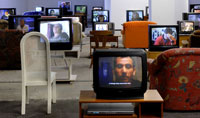Berlin’s Tanas Gallery (Gallery for Contemporary Turkish Art) shows currently the prize-winning 2004 work “Küba” of Kutlug Ataman.
The installation of 40 interviews on old-fashioned TV models, each supplied with an individual 2 second hand chair, creates a chorus of voices each telling their own story. In front of the monitor one is solely confronted with the displayed person’s destiny, but still the room creates a soundscape of murmuring narration. Thus for someone who does not understand the language, like me, there is no disturbance in reading the subtitles on the screen, but I wonder how it feels when one can understand each word … Nevertheless in any case a very worthwhile view.
 |
The video installation Küba consists of 40 interviews which are presented on old televisions. A second-hand seat is placed in front of each TV and as soon as the viewer sits down an intimate situation is created between him and the particular person who narrates about his or her life in |
 |
the Gecekondu settlement Küba in Istanbul. Gecekondu (plural: Gecekondular) is the Turkish name for a house in a marginalized settlement, that is a non-planned quarter, with simple accommodations at the outskirts of a city (not synonymous with an impoverished slum). |
| The translation of Gecekondu means “put up at night†(from Turkish gece: night). The term goes back to a common law from the Ottoman period: A house that was built “over night“ on public ground was permitted to be inhabited on a long-term basis and could not be pulled down.
The settlement Küba was built in the 1960ies by migrants and soon became a place of refuge also for other outsiders like opposition activists, Kurds, smugglers, drug adicts, transvestites as well as Islamic fundamentalists and nationalists. Since then it has developed into a cohesive society which presents itself to the outside world with impenetrable solidarity and a by now legendary sense of resistance, and which settles its internal affairs by own principles. Küba considers itself to be an anarchic enclave in the midst of a society, the social and political values of which are considered to be unjust and corrupt. In this understanding of a solidarity which was created by exclusion the Kübans find their identity – not without proud. For more than two years Kutlug Ataman has worked with the inhabitants of Küba. The interviews with former left-wing militants, unemployed persons, overstrained mothers or furious teenagers narrate about tragic, sometimes bitter events, about humiliation and loss, but also about dreams, luck and love. They are arresting stories which leave a lasting impression and they balance on this narrow ridge where memory changes into myth and fiction. Here, as in other works by Ataman, individuals who live outside the conventional social categories get a word and in the narration they invent themselves anew. The interviews, the reality of which is emphazised by the slightly blurred images of the hand camera and only a few cuts, show that documentations are narrations – and thus constructed: “Each story, and therefore each life, in the end is created by its subject as art.†|
|
more links:
